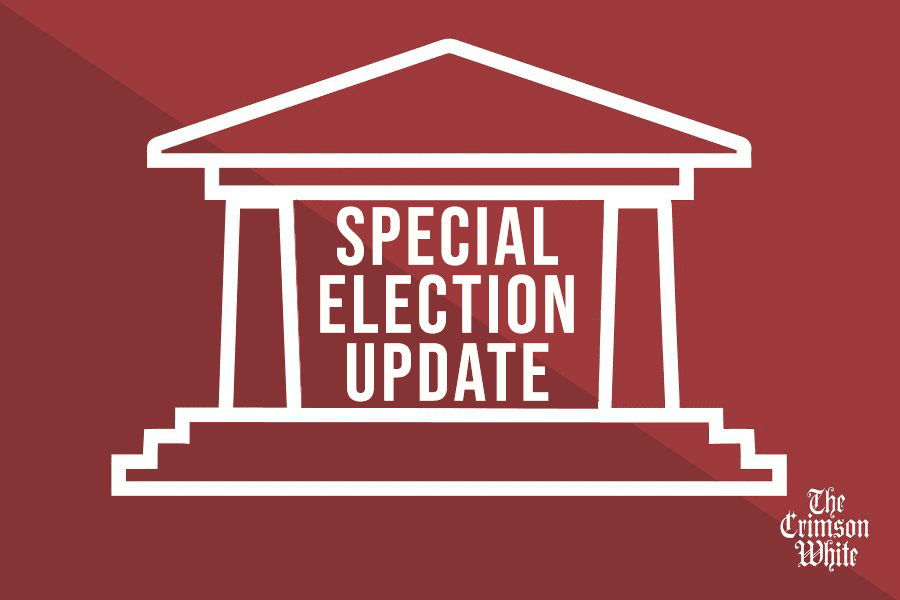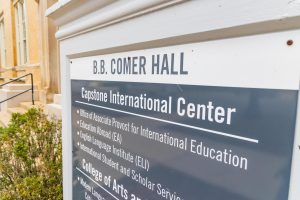Elections Board yet to hold special Senate election to fill senate vacancy
September 18, 2022
The University of Alabama Student Elections Board has not held a special Senate election for a vacant graduate seat, which is potentially in violation of the Student Government Association Constitution and the Elections Manual.
Former Senator Justin McCleskey won a seat for the graduate school in the Spring 2022 elections. On April 1, he resigned his position due to a scheduling conflict. The graduate seat remained vacant for the remainder of the semester and the SGA has not tried to fill the position since. Although McCleskey resigned six months ago, his name still appears on the SGA website.
The SGA Constitution states in Article III, Section 4, Subsection B that a special Senate election must be held “every twenty full class days beginning from the first day of the fall semester until forty class days prior to spring SGA elections.” The fall semester began on Aug. 17. A special Senate election should have been held on Sept. 14 — twenty full class days after Aug. 17 — per the SGA guidelines.
No special Senate election has been held.
The constitution denotes that all SGA elections and campaigns are overseen by the Student Elections Board. The Elections Manual further states that the Elections Board is responsible for establishing and disseminating all election related dates and information.
“The Elections Board shall oversee setting all dates of the election-related events listed in this section subject to any further provisions of the Elections Manual. All deadlines and dates related to filing, campaigning, and election days for Special and Spring General Elections shall be declared by the Chair of the Elections Board,” the manual reads.
SGA Press Secretary Trinity Hunter declined to comment on behalf of SGA.
“Concerning SGA Elections, we defer to the statements made by the Elections Board,” Hunter said.
The Elections Board said in a statement that they are dedicated to upholding the rules of the governing documents of SGA despite not holding the special election in the constitutional timeline.
“The Elections Board is committed to ensuring fair, unbiased, and impartial elections in accordance with the rules and guidelines set forth by the SGA Constitution, Code of Laws, and Election Manual,” the statement read. “Due to constraints outside the control of SGA and the Elections Board, hosting an election twenty full class days after the first day of class was not logistically feasible.”
According to the Elections Board, the online voting systems used in SGA elections require more time to prepare than traditional paper voting, which was the method used when the Constitution was written.
“It is important to note that the [Constitution] was written at a time when paper ballots and physical polling stations were being utilized. The online voting systems of today, are more complex and require a minimum lead time for poll setup and testing,” the statement said. “Noting these constraints and a governing document that has, unfortunately, not kept up with the pace of technology, an opinion was sought from the Attorney General to both ensure that the spirit of the law is being maintained and that students have ample opportunity to participate in a fair electoral process.”
The SGA Constitution was last revised on Sept. 13, according to the SGA website.
The Elections Board additionally provided The Crimson White a copy of an opinion from SGA Attorney General David Strickland, addressed to the SGA Senate and Elections Board that was issued on Aug. 22.
Strickland’s opinion stated that the Constitution’s inclusion of the word “every” within the phrasing of the article cannot be interpreted to literally mean every twenty days after the first day of the semester.
Referring to the inset clause from the SGA Constitution, Strickland said that “in this case, the word ‘every’ does not imply that special elections for Senate vacancies should be held every twenty full class days starting the first day of the fall semester up until forty class days prior to spring elections. Instead, it refers to the time period in which special elections for Senate vacancies are eligible to be held each year.”
Strickland said that due to the electronic voting systems used during elections, which take more than 20 days to set up, “it is unreasonable to expect special elections for Senate vacancies to be held every twenty full class days.”
He declared that special Senate elections can be “held sometime between twenty full class days after the first day of the fall semester and forty class days prior to spring SGA elections; they should not be held every twenty full class days during that time period.”
While the position of the Attorney General is granted to right to “issue legal opinions on matters pertaining to this Constitution and any rules or regulations which may be established pursuant [to the Constitution], Strickland is also responsible for ‘for the upkeep of the SGA Constitution and any rules or regulations which may be established pursuant [to the Constitution].’”
The Constitution has not been updated to address any of the timeline and voting process concerns for special Senate elections that Strickland stated in his Aug. 22 opinion or the Elections Board cited in their response.
Last year, the Elections Board failed to correctly publicize the timeline for the 2021 homecoming queen election. They additionally delayed the timeline for the special Senate election last October to meet the guidelines of the Constitution, which required the election timeline to be posted 21 class days before the election.
The Elections Board had not publicized any date or timeline for a special election to fill the vacant graduate school seat prior to The Crimson White’s request for comment on Sept. 14.
In a response to the CW on Sept. 16, the Elections Board confirmed in its statement that a special election will be held and that “information about the timeline will be included in the Special Elections Announcement to be released on Monday, September 26.”
SGA adviser Angel Navarez-Lugo did not respond to a request for comment. Student Elections Board adviser Kat Gillan did not respond to a request for comment.
Justin McCleskey is the Opinions Editor for The Crimson White.




















